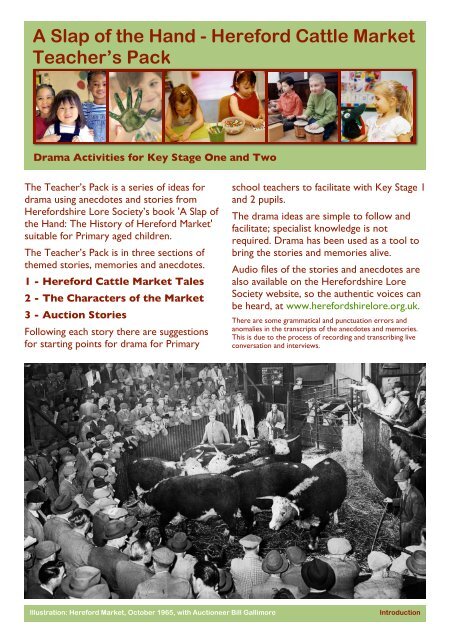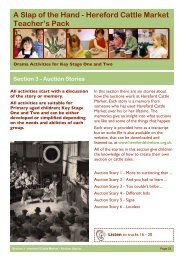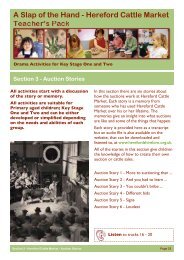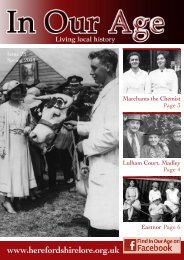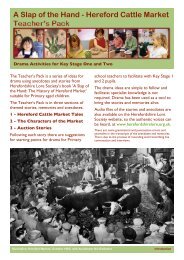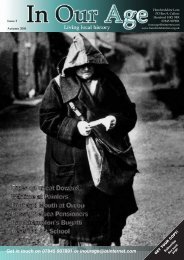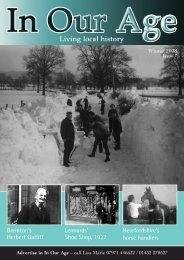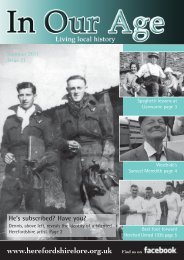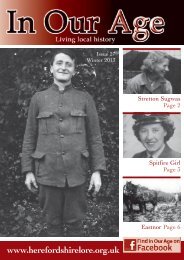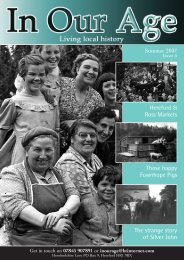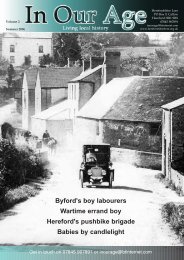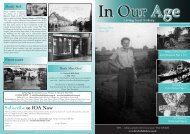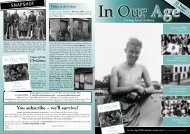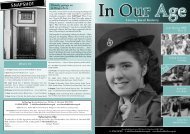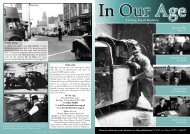A Slap of the Hand - Hereford Cattle Market Teacher's Pack
A Slap of the Hand - Hereford Cattle Market Teacher's Pack
A Slap of the Hand - Hereford Cattle Market Teacher's Pack
Create successful ePaper yourself
Turn your PDF publications into a flip-book with our unique Google optimized e-Paper software.
A <strong>Slap</strong> <strong>of</strong> <strong>the</strong> <strong>Hand</strong> - <strong>Hereford</strong> <strong>Cattle</strong> <strong>Market</strong><br />
Teacher’s <strong>Pack</strong><br />
Drama Activities for Key Stage One and Two<br />
The Teacher’s <strong>Pack</strong> is a series <strong>of</strong> ideas for<br />
drama using anecdotes and stories from<br />
<strong>Hereford</strong>shire Lore Society’s book 'A <strong>Slap</strong> <strong>of</strong><br />
<strong>the</strong> <strong>Hand</strong>: The History <strong>of</strong> <strong>Hereford</strong> <strong>Market</strong>'<br />
suitable for Primary aged children.<br />
The Teacher’s <strong>Pack</strong> is in three sections <strong>of</strong><br />
<strong>the</strong>med stories, memories and anecdotes.<br />
1 - <strong>Hereford</strong> <strong>Cattle</strong> <strong>Market</strong> Tales<br />
2 - The Characters <strong>of</strong> <strong>the</strong> <strong>Market</strong><br />
3 - Auction Stories<br />
Following each story <strong>the</strong>re are suggestions<br />
for starting points for drama for Primary<br />
school teachers to facilitate with Key Stage 1<br />
and 2 pupils.<br />
The drama ideas are simple to follow and<br />
facilitate; specialist knowledge is not<br />
required. Drama has been used as a tool to<br />
bring <strong>the</strong> stories and memories alive.<br />
Audio files <strong>of</strong> <strong>the</strong> stories and anecdotes are<br />
also available on <strong>the</strong> <strong>Hereford</strong>shire Lore<br />
Society website, so <strong>the</strong> au<strong>the</strong>ntic voices can<br />
be heard, at www.herefordshirelore.org.uk.<br />
There are some grammatical and punctuation errors and<br />
anomalies in <strong>the</strong> transcripts <strong>of</strong> <strong>the</strong> anecdotes and memories.<br />
This is due to <strong>the</strong> process <strong>of</strong> recording and transcribing live<br />
conversation and interviews.<br />
Illustration: <strong>Hereford</strong> <strong>Market</strong>, October 1965, with Auctioneer Bill Gallimore<br />
Introduction
A <strong>Slap</strong> <strong>of</strong> <strong>the</strong> <strong>Hand</strong> - <strong>Hereford</strong> <strong>Cattle</strong> <strong>Market</strong><br />
Teacher’s <strong>Pack</strong><br />
Drama Activities for Key Stage One and Two<br />
Section 1 - <strong>Hereford</strong> <strong>Cattle</strong> <strong>Market</strong> - Tales<br />
All activities start with a discussion <strong>of</strong> <strong>the</strong> story or memory.<br />
All activities are suitable for Primary aged children; Key Stage One and<br />
Two and can be ei<strong>the</strong>r developed or simplified depending on <strong>the</strong> needs<br />
and abilities <strong>of</strong> each group.<br />
In this section <strong>the</strong>re are ten stories about<br />
<strong>Hereford</strong> <strong>Cattle</strong> <strong>Market</strong>. Some <strong>of</strong> <strong>the</strong> stories<br />
are describing what <strong>the</strong> market used to be<br />
like. You can get a really good idea <strong>of</strong> <strong>the</strong><br />
atmosphere, hustle and bustle from some <strong>of</strong><br />
<strong>the</strong> descriptions. Some <strong>of</strong> <strong>the</strong> memories are<br />
about <strong>the</strong> animals and how <strong>the</strong>y got to<br />
market.<br />
Each story gives us some information about<br />
how people used to live, what <strong>Hereford</strong><br />
<strong>Cattle</strong> <strong>Market</strong> used to be like and tells us<br />
something about human’s relationships with<br />
animals.<br />
The stories can be used in a number <strong>of</strong><br />
ways. Drama activities are suggested here to<br />
give pupils <strong>the</strong> ability to recreate <strong>the</strong> market,<br />
its people and its animals.<br />
Each story is provided here as a transcript<br />
but an audio file is also available on <strong>the</strong><br />
website that can be downloaded and listened<br />
to.<br />
<strong>Market</strong> Tale 1 - A fantastic place<br />
<strong>Market</strong> Tale 2 - Who is that?<br />
<strong>Market</strong> Tale 3 - Walking <strong>the</strong> cows<br />
<strong>Market</strong> Tale 4 - Drive ‘em<br />
<strong>Market</strong> Tale 5 - Lamb<br />
<strong>Market</strong> Tale 6 - Pig<br />
<strong>Market</strong> Tale 7 - Chickens<br />
<strong>Market</strong> Tale 8 - Cows<br />
<strong>Market</strong> Tale 9 - Pig race<br />
<strong>Market</strong> Tale 10 - Wife for sale<br />
Auctioneer Mr Hammond<br />
Listen to tracks 1 - 9<br />
Section 1 - <strong>Hereford</strong> <strong>Cattle</strong> <strong>Market</strong> - Tales Page 2
A <strong>Slap</strong> <strong>of</strong> <strong>the</strong> <strong>Hand</strong> - <strong>Hereford</strong> <strong>Cattle</strong> <strong>Market</strong><br />
Teacher’s <strong>Pack</strong><br />
Drama Activities for Key Stage One and Two<br />
<strong>Market</strong> Tale 1 - A Fantastic Place<br />
Terry Court: "The <strong>Market</strong> was a fantastic place to be. And you have to remember it's<br />
nothing like it was <strong>the</strong>n. We were having anything up to 3 or 4000 fat sheep on a Monday;<br />
we'd have 500 pigs and 600 fat cattle, that's on Monday. Tuesday we'd have 600 bulls or 200<br />
horses. On a Wednesday we'd have 12000 sheep, 1000 pigs, 600 calves, 500 weaning sturkie<br />
things - young cattle: <strong>the</strong>re's calves, cows, cattle and <strong>the</strong>n store cattle - and <strong>the</strong>n on a<br />
Thursday we'd have anything up to 2000 store cattle up to 600 barren cows and up to 400<br />
dairy on a Friday so it was a busy old place."<br />
DRAMA 1 - Sound creation <strong>of</strong><br />
<strong>Hereford</strong> <strong>Cattle</strong> <strong>Market</strong><br />
Following on from <strong>the</strong> discussion about <strong>the</strong><br />
<strong>Market</strong>, ask <strong>the</strong> children to sit in a circle and<br />
to choose a sound that would have been<br />
heard on a busy market day. It could be an<br />
animal noise or a person saying or shouting<br />
something at <strong>the</strong> <strong>Market</strong>. Listen to each<br />
individual sound - encourage a wide range <strong>of</strong><br />
different sounds. Ask <strong>the</strong> children to <strong>the</strong>n<br />
practice <strong>the</strong>ir sounds in pairs, to practice<br />
with different volumes and intensities.<br />
Then, working as a conductor, you need to<br />
agree and practice some signals to start <strong>the</strong><br />
group making sounds, to increase and<br />
decrease volume, to have whole group<br />
making sounds, to end sounds. Then<br />
conduct <strong>the</strong> group to create <strong>the</strong>ir<br />
“soundscape” <strong>of</strong> <strong>the</strong> <strong>Market</strong>. Use just animal<br />
sounds, <strong>the</strong>n just human, build <strong>the</strong> sound up<br />
to a crescendo and <strong>the</strong>n slowly stop <strong>the</strong><br />
sounds one at a time to bring <strong>the</strong> <strong>Market</strong> to<br />
a close.<br />
Experiment with: animal noises only, human<br />
voices only, a busy day and different times <strong>of</strong><br />
<strong>the</strong> day. Encourage <strong>the</strong> children to<br />
experiment with taking a turn as <strong>the</strong><br />
conductor.<br />
Listen to Terry Court, track 1<br />
DISCUSSION<br />
Have you visited <strong>Hereford</strong> <strong>Cattle</strong> <strong>Market</strong>?<br />
What animals did you see <strong>the</strong>re?<br />
Can you describe what <strong>the</strong> market is like?<br />
DRAMA 2 - <strong>Market</strong> alive<br />
Repeat exercise 1, now with <strong>the</strong> children<br />
creating freeze-frames (still images) <strong>of</strong> <strong>the</strong><br />
people or animals <strong>the</strong>y were being at <strong>the</strong><br />
<strong>Market</strong>.<br />
Group similar animals and people toge<strong>the</strong>r.<br />
Bring <strong>the</strong> whole thing to life - use <strong>the</strong> same<br />
commands as with <strong>the</strong> sound conducting to<br />
bring <strong>the</strong> freeze-frames to life and <strong>the</strong><br />
children begin to move around.<br />
Change positions <strong>of</strong> those children being<br />
farmers to control <strong>the</strong> animals if necessary.<br />
Now add in <strong>the</strong> sounds as well to recreate<br />
<strong>the</strong> market you have heard about in <strong>the</strong><br />
story.<br />
Use <strong>the</strong> conductor signals throughout to<br />
control <strong>the</strong> action and noise level!<br />
Section 1 - <strong>Hereford</strong> <strong>Cattle</strong> <strong>Market</strong> - Tales Page 3
A <strong>Slap</strong> <strong>of</strong> <strong>the</strong> <strong>Hand</strong> - <strong>Hereford</strong> <strong>Cattle</strong> <strong>Market</strong><br />
Teacher’s <strong>Pack</strong><br />
Drama Activities for Key Stage One and Two<br />
<strong>Market</strong> Tale 2 - Who is that?<br />
Joanne Probert: "I just remember <strong>the</strong> market as<br />
being enormous, every day <strong>of</strong> <strong>the</strong> week, horses,<br />
cattle, pigs all sorts <strong>of</strong> things. Huge market and all<br />
<strong>the</strong> stock would come in from all around. I loved<br />
<strong>the</strong> market; I used to walk to <strong>the</strong> market on <strong>the</strong><br />
way down to <strong>the</strong> stables, just to see <strong>the</strong> animals.<br />
All <strong>the</strong>se cheapjacks. People used to bargain in <strong>the</strong><br />
middle, selling medicines and all sorts <strong>of</strong> things.<br />
<strong>Hereford</strong> was purely a market town.<br />
Everybody knew everybody. Many years after we<br />
had this store out here, Normans, well it<br />
was Meadow <strong>Market</strong> first <strong>of</strong> all and <strong>the</strong><br />
supervisor down <strong>the</strong>re was a lovely girl who<br />
used to be in <strong>the</strong> National Bank in Broad<br />
Street and I was talking to her one day and<br />
she said, ‘Do you know, when I was in <strong>the</strong><br />
bank, you might look through <strong>the</strong> window<br />
and you’d see somebody walking down by<br />
<strong>the</strong> Green Dragon who you didn’t know and<br />
you’d say, ”who is that?” You wouldn’t<br />
know anybody in <strong>Hereford</strong> now, but <strong>the</strong>n if<br />
you saw someone strange walking down<br />
Broad Street you would think, who is that?”<br />
Listen to Joanne Probert, track 2<br />
DISCUSSION<br />
What does this story add to what we knew<br />
about <strong>the</strong> <strong>Market</strong> already?<br />
What kind <strong>of</strong> things do you think people<br />
were selling?<br />
What do you think a “cheapjack” is?<br />
Can you imagine knowing everyone in<br />
<strong>Hereford</strong>?<br />
DRAMA - <strong>Market</strong> traders<br />
Group <strong>the</strong> children into pairs. They are<br />
going to create <strong>the</strong>ir own imaginary market<br />
stall. The children can use a cloth on <strong>the</strong><br />
floor to create <strong>the</strong>ir stall or stand behind an<br />
empty table.<br />
Encourage <strong>the</strong> children to think about what<br />
<strong>the</strong>y might sell. Ask <strong>the</strong>m to think about<br />
markets <strong>the</strong>y may hav been to and how<br />
traders get customers attention.<br />
Will <strong>the</strong>y shout about what <strong>the</strong>y’ve got?<br />
Will <strong>the</strong>y try to catch people’s eye or<br />
attention?<br />
What different sorts <strong>of</strong> things could <strong>the</strong>y<br />
sell?<br />
Once <strong>the</strong> children have created <strong>the</strong>ir own<br />
stall and practiced selling encourage <strong>the</strong><br />
pairs to take turns in shopping at each<br />
o<strong>the</strong>r’s imaginary stalls.<br />
Ask <strong>the</strong> children:<br />
Who is a confident seller? Who has great<br />
things to sell? Who has an interesting way <strong>of</strong><br />
selling?<br />
Section 1 - <strong>Hereford</strong> <strong>Cattle</strong> <strong>Market</strong> - Tales Page 4
A <strong>Slap</strong> <strong>of</strong> <strong>the</strong> <strong>Hand</strong> - <strong>Hereford</strong> <strong>Cattle</strong> <strong>Market</strong><br />
Teacher’s <strong>Pack</strong><br />
Drama Activities for Key Stage One and Two<br />
<strong>Market</strong> Tale 3 - Walking <strong>the</strong> cows<br />
Colin Manning: "A long time ago, animals were walked to market, which people don’t realise.<br />
There were some farmers at Hampton Bishop - Ivor Rogers, Alan Paske - who walked <strong>the</strong>ir<br />
cattle to market on a Wednesday morning. There was a dealer called Fred Ralph who lived<br />
at Moor Farm Lane who walked his cattle to market and caused absolute chaos with Holy<br />
Trinity Church! Prebendary Snell didn’t like <strong>the</strong>m stopping <strong>the</strong>re to use <strong>the</strong> public lavatory!<br />
But <strong>the</strong>y all came and <strong>the</strong>n <strong>the</strong> o<strong>the</strong>rs came usually by lorry or <strong>the</strong>y walked."<br />
Listen<br />
to<br />
Colin Manning<br />
track 3<br />
DISCUSSION<br />
Can you imagine a<br />
farmer herding his<br />
cows through <strong>the</strong><br />
centre <strong>of</strong> <strong>Hereford</strong><br />
today?<br />
What must it have<br />
been like?<br />
<strong>Cattle</strong> in Broad Street, <strong>Hereford</strong><br />
DRAMA - Cow herding<br />
Place <strong>the</strong> children in small groups <strong>of</strong> four or<br />
five. One child needs to act as <strong>the</strong> farmer<br />
and rest as his cows.<br />
Ask <strong>the</strong> farmer to imagine that he has to<br />
take his cows on a journey to market<br />
through <strong>the</strong> centre <strong>of</strong> <strong>Hereford</strong>. What are<br />
<strong>the</strong> difficulties he might face?<br />
How easy is it to take <strong>the</strong>m on a journey -<br />
let <strong>the</strong> cows have a mind <strong>of</strong> <strong>the</strong>ir own!<br />
Gradually increase <strong>the</strong> number <strong>of</strong> cows for<br />
each farmer to herd.<br />
O<strong>the</strong>r children can take on <strong>the</strong> role <strong>of</strong> <strong>the</strong><br />
vicar/passers by.<br />
Section 1 - <strong>Hereford</strong> <strong>Cattle</strong> <strong>Market</strong> Tales Page 5
A <strong>Slap</strong> <strong>of</strong> <strong>the</strong> <strong>Hand</strong> - <strong>Hereford</strong> <strong>Cattle</strong> <strong>Market</strong><br />
Teacher’s <strong>Pack</strong><br />
Drama Activities for Key Stage One and Two<br />
<strong>Market</strong> Tale 4 - Drive 'em<br />
Mr Mat<strong>the</strong>ws: "Drive ‘em. Drive ‘em through town. I’ve driven cows through <strong>Hereford</strong>. Yes,<br />
we kept a bit <strong>of</strong> land at Whitecross and when I was at school, we’d take our cows that were<br />
dry, not milking, we only had that small farm at Bartonsham, and fa<strong>the</strong>r would say ‘well, we’ll<br />
drive those cows up to Whitecross.’ For <strong>the</strong>ir summer holidays, ‘cause <strong>the</strong>y were dry you<br />
see.<br />
We’d drive ‘em through town. We’d drive ‘em right through High Town. ‘Cause <strong>the</strong>re<br />
wasn’t much traffic about mind. It was quite legal to do that. Yes, I’ve walked cattle through<br />
High Town, we had ‘em up Whitecross, over that bridge by Bulmer’s, and on <strong>the</strong> right as<br />
you go past Bulmer’s and on a bit, <strong>the</strong>re’s some houses with passageways, round <strong>the</strong> back,<br />
and a cow went up a passageway <strong>the</strong>re once and <strong>the</strong>re was some ladies doing some washing<br />
in tub and she turned <strong>the</strong> tub over and got all excited about this cow. Really good fun!<br />
They are herd animals so <strong>the</strong>re’s a couple<br />
who are always leading and if <strong>the</strong>re’s enough<br />
people around, just blocking <strong>the</strong> odd streets.<br />
When you’re going up Whitecross you’ve<br />
got Baggally Street, Stanhope Street, all<br />
<strong>the</strong>se streets going <strong>of</strong>f, and if you’ve got<br />
somebody standing <strong>the</strong>re, <strong>the</strong>y’ll keep going.<br />
But <strong>of</strong> course cows were kept for a lot<br />
longer in those days, have <strong>the</strong>m for six or<br />
seven years probably, and <strong>the</strong>y get to know<br />
<strong>the</strong> ropes!<br />
They know where <strong>the</strong>y’re going. They’re<br />
knowing animals."<br />
Listen to Mr Mat<strong>the</strong>ws, track 4<br />
DISCUSSION<br />
Mr Mat<strong>the</strong>ws used to take his cows on<br />
quite a long journey - what o<strong>the</strong>r sorts <strong>of</strong><br />
mischief do you think <strong>the</strong> cows got into?<br />
DRAMA (More suitable for Key<br />
Stage Two)<br />
Get <strong>the</strong> children into small groups <strong>of</strong> four or<br />
five to create a drama <strong>of</strong> Mr Mat<strong>the</strong>ws, his<br />
cows and <strong>the</strong> ladies doing <strong>the</strong>ir washing in<br />
<strong>the</strong>ir backyards. Allow <strong>the</strong> groups some<br />
freedom in letting <strong>the</strong>m choose how <strong>the</strong>y<br />
present <strong>the</strong> story-<strong>the</strong> material is so rich-you<br />
are just asking <strong>the</strong>m to recreate what <strong>the</strong>y<br />
have listened to.<br />
To encourage more creativity ask <strong>the</strong><br />
children to consider some <strong>of</strong> <strong>the</strong> following<br />
points and address <strong>the</strong>m in <strong>the</strong>ir dramas:<br />
Think about what kind <strong>of</strong> phrases <strong>the</strong> ladies<br />
would have said if a cow suddenly appeared<br />
in <strong>the</strong>ir backyard.<br />
What would Mr Mat<strong>the</strong>ws be doing and<br />
saying?<br />
How can you end <strong>the</strong> story?<br />
What would <strong>the</strong> ladies say after <strong>the</strong> cows<br />
have gone?<br />
Section 1 - <strong>Hereford</strong> <strong>Cattle</strong> <strong>Market</strong> Tales Page 6
A <strong>Slap</strong> <strong>of</strong> <strong>the</strong> <strong>Hand</strong> - <strong>Hereford</strong> <strong>Cattle</strong> <strong>Market</strong><br />
Teacher’s <strong>Pack</strong><br />
Drama Activities for Key Stage One and Two<br />
<strong>Market</strong> Tales 5 - Lamb<br />
Peter: They used to have a bit <strong>of</strong> a system,<br />
didn’t <strong>the</strong>y? For if livestock got out <strong>of</strong> <strong>the</strong><br />
market. You always used to run to shut <strong>the</strong><br />
gates, ‘cause obviously when <strong>the</strong>y were<br />
unloading stock, occasionally one used to get<br />
out and we always remember this, <strong>the</strong>re was<br />
a lamb got out <strong>of</strong> <strong>the</strong> market, didn’t it?<br />
Reg: Yes.<br />
Peter: And it got down Eign Gate. Well I<br />
used to work in <strong>the</strong> slaughterhouse and we<br />
got a phone call ‘<strong>the</strong>re’s a lamb got out up<br />
Eign Gate. Go and find <strong>the</strong> boys in <strong>the</strong> van<br />
and fetch it.’ So this lamb had got out <strong>of</strong> <strong>the</strong><br />
cattle market, run up Eign Gate and for<br />
some unknown reason it got in Dorothy<br />
Perkins. And <strong>the</strong>re were two policemen<br />
outside.<br />
Reg: They wouldn’t go inside!<br />
Peter: The lamb was inside in Dorothy<br />
Perkins and you can imagine now <strong>the</strong> lamb<br />
now going round taking all <strong>the</strong> clo<strong>the</strong>s <strong>of</strong>f <strong>of</strong><br />
<strong>the</strong> railings well it could see itself in <strong>the</strong><br />
mirror and it was ramming <strong>the</strong> mirror and<br />
trying to smash <strong>the</strong> mirror, well you can<br />
imagine what a lamb does ... all on <strong>the</strong> floor.<br />
It had done it everywhere and <strong>the</strong> two girls<br />
in <strong>the</strong> shop were stood inside up onto <strong>the</strong><br />
counter screaming. So we just walked in and<br />
said to <strong>the</strong> cop ‘oh just hold <strong>the</strong> door,’ we<br />
just walked in, picked him up, we sat him in<br />
a wheelbarrow and walked him in <strong>the</strong><br />
wheelbarrow and put him in <strong>the</strong> warehouse.<br />
Listen to Peter and Reg Bayliss,<br />
track 5<br />
Freddy Fox, sheep drover<br />
DRAMA - Lamb<br />
Ask <strong>the</strong> children to recreate <strong>the</strong> story <strong>of</strong> <strong>the</strong><br />
escaping lamb in Dorothy Perkins.<br />
Groups will need people to choose to be<br />
<strong>the</strong> farmer who lost his lamb, two<br />
policemen, people working in <strong>the</strong> shop and<br />
people shopping. They will also need<br />
someone to be <strong>the</strong> lamb. Ask <strong>the</strong> children to<br />
work out where <strong>the</strong> shop is and who is<br />
standing where.<br />
Use <strong>the</strong> technique <strong>of</strong> freezing and unfreezing<br />
<strong>the</strong> action to control what’s happening and<br />
also to ask questions eg;<br />
What’s going on here?<br />
How do you feel?<br />
What do you think should happen next?<br />
Ask <strong>the</strong> children to think about <strong>the</strong> kind <strong>of</strong><br />
phrases <strong>the</strong> different characters would say in<br />
this unusual situation. This activity can work<br />
as a whole group activity where you add in<br />
more and more characters and action.<br />
Keep using <strong>the</strong> “freeze” and “unfreeze” to<br />
keep control <strong>of</strong> <strong>the</strong> story.<br />
Section 1 - <strong>Hereford</strong> <strong>Cattle</strong> <strong>Market</strong> Tales Page 7
A <strong>Slap</strong> <strong>of</strong> <strong>the</strong> <strong>Hand</strong> - <strong>Hereford</strong> <strong>Cattle</strong> <strong>Market</strong><br />
Teacher’s <strong>Pack</strong><br />
Drama Activities for Key Stage One and Two<br />
<strong>Market</strong> Tales - Taking animals to <strong>Market</strong><br />
Here are three different stories (6, 7 and 8), about taking different types<br />
<strong>of</strong> animals to market; a pig, some chickens and more cows. Listen to all<br />
three stories and <strong>the</strong>n have a go at <strong>the</strong> drama activities.<br />
<strong>Market</strong> Tales 6 - Pig<br />
John Mat<strong>the</strong>ws: "People would take a pig to<br />
market, <strong>the</strong>y’d put a cord on <strong>the</strong> back leg <strong>of</strong><br />
<strong>the</strong> pig, and <strong>of</strong>f pig would go in front, and<br />
<strong>the</strong>y’d be coming round, holding <strong>the</strong> cord.<br />
It’s how you take a pig to market."<br />
<strong>Market</strong> Tales 7 - Chickens<br />
David Probert: "Even up until 5 years ago<br />
<strong>the</strong> methods <strong>of</strong> transportation, taking<br />
chickens into <strong>the</strong> market were quite<br />
extraordinary. You’d see a couple pairs <strong>of</strong><br />
chickens balanced in a sack on ei<strong>the</strong>r side <strong>of</strong><br />
<strong>the</strong> handlebars <strong>of</strong> a bike and that type <strong>of</strong><br />
thing because obviously that sort <strong>of</strong> chicken<br />
market serves smallholders and people like<br />
that who’ve got a few in <strong>the</strong> back garden and<br />
even up to 5 years ago that was happening."<br />
Listen to John Mat<strong>the</strong>ws, track 6<br />
Listen to David Probert, track 7<br />
DISCUSSION - see page 9<br />
DRAMA - see page 10<br />
Section 1 - <strong>Hereford</strong> <strong>Cattle</strong> <strong>Market</strong> Tales Page 8
A <strong>Slap</strong> <strong>of</strong> <strong>the</strong> <strong>Hand</strong> - <strong>Hereford</strong> <strong>Cattle</strong> <strong>Market</strong><br />
Teacher’s <strong>Pack</strong><br />
Drama Activities for Key Stage One and Two<br />
<strong>Market</strong> Tale 8 - Cows<br />
Tom Wheatstone: "Some <strong>of</strong> <strong>the</strong> houses down Three Elms Road weren’t happy with <strong>the</strong><br />
cattle - <strong>the</strong>y kept going on <strong>the</strong>ir gardens and digging up <strong>the</strong>ir gardens! There’s one person I<br />
met <strong>the</strong> o<strong>the</strong>r day, she was <strong>the</strong>re when I was on my horse and cart, those days. Dr.<br />
Chamberlain’s wife. And she is still about, and still living in <strong>the</strong> same house.<br />
And I bumped into her ages ago and I said ‘Oh, hello Mrs. Chamberlain. You don’t<br />
remember me. I was your milkman. I was <strong>the</strong> one who used to get <strong>the</strong> cattle out <strong>of</strong> your<br />
garden!' She had lovely green grass, and <strong>the</strong> cows would go for green grass!<br />
We used to get shouted at. You come down<br />
Whitecross, you’d got anything up to a<br />
hundred cattle and you got a dog <strong>the</strong>re and<br />
you’ve got to run on and stop <strong>the</strong>m going<br />
down each street. Soon as you come to where<br />
<strong>the</strong> old traffic lights were, <strong>the</strong> old copper was<br />
in <strong>the</strong>re. We’d stop <strong>the</strong>re with <strong>the</strong> cattle that<br />
was going up to market. Oh, it was<br />
horrendous.<br />
They would just wander into gardens. But<br />
sometimes, you’d run ahead <strong>of</strong> yourselves and<br />
shut <strong>the</strong> gates, to get <strong>the</strong>m through."<br />
Sarah: "And would <strong>the</strong>y go down <strong>the</strong><br />
alleyways?"<br />
Tom: "Depends if <strong>the</strong> first couple decided to<br />
stray! Then <strong>the</strong>y would all follow!<br />
Sometimes, I was in front and I’d be holding<br />
<strong>the</strong>m back with a stick. Then I’d go onto<br />
school and <strong>the</strong>n go back after school.<br />
Sometimes <strong>the</strong>re was only a few to go up,<br />
and sometimes nothing at all."<br />
Listen to Tom Wheatstone,<br />
track 8<br />
DRAMA - see page 10<br />
DISCUSSION<br />
In <strong>the</strong>se three stories <strong>the</strong> animals were all<br />
brought to <strong>the</strong> <strong>Cattle</strong> <strong>Market</strong> in different<br />
ways and different things happened to<br />
<strong>the</strong>m.<br />
Which story did you think was <strong>the</strong><br />
funniest?<br />
Which story were you most surprised by?<br />
Can you think <strong>of</strong> some unusual ways <strong>of</strong><br />
moving animals from one place to ano<strong>the</strong>r?<br />
Section 1 - <strong>Hereford</strong> <strong>Cattle</strong> <strong>Market</strong> Tales Page 9
A <strong>Slap</strong> <strong>of</strong> <strong>the</strong> <strong>Hand</strong> - <strong>Hereford</strong> <strong>Cattle</strong> <strong>Market</strong><br />
Teacher’s <strong>Pack</strong><br />
Drama Activities for Key Stage One and Two<br />
<strong>Market</strong> Tales - Taking animals to <strong>Market</strong><br />
In <strong>the</strong> last three <strong>Market</strong> Tales (6, 7 and 8) we heard about taking different<br />
types <strong>of</strong> animals to market; a pig, some chickens and more cows. Listen to<br />
all three stories and <strong>the</strong>n have a go at <strong>the</strong> drama activities:<br />
DRAMA 1 - Transporting <strong>the</strong><br />
animals<br />
A pig on a rope, a chicken on handlebars and<br />
cows in <strong>the</strong> garden - <strong>the</strong>re were many funny<br />
and unusual sights on <strong>the</strong> way to market.<br />
Working individually choose a type <strong>of</strong> animal<br />
that you would like to get somewhere - it<br />
could be a type <strong>of</strong> animal that goes to market<br />
or it could be something more exotic. Decide<br />
how you are going to move it and act this out<br />
for <strong>the</strong> rest <strong>of</strong> your group. See if <strong>the</strong> group<br />
can guess what type <strong>of</strong> animal you are moving<br />
by your brilliant acting.<br />
DRAMA 2 - Transporting <strong>the</strong><br />
animals<br />
Working in pairs - one person is <strong>the</strong> animal,<br />
<strong>the</strong> o<strong>the</strong>r has to move it somewhere. Act<br />
this out for <strong>the</strong> rest <strong>of</strong> your group. Let <strong>the</strong><br />
person have only one phrase that <strong>the</strong>y can<br />
keep on saying to <strong>the</strong> animal and <strong>the</strong> animal<br />
needs to be making a noise.<br />
Driving calves through Ledbury<br />
Section 1 - <strong>Hereford</strong> <strong>Cattle</strong> <strong>Market</strong> Tales Page 10
A <strong>Slap</strong> <strong>of</strong> <strong>the</strong> <strong>Hand</strong> - <strong>Hereford</strong> <strong>Cattle</strong> <strong>Market</strong><br />
Teacher’s <strong>Pack</strong><br />
Drama Activities for Key Stage One and Two<br />
<strong>Market</strong> Tale 9 - Pig race<br />
Colin Manning: "At that time <strong>the</strong>re was a local character about by <strong>the</strong> name <strong>of</strong> Cole, who<br />
came to <strong>Hereford</strong> and lived on Vowchurch Common. He won <strong>the</strong> Powderhall sprint, which<br />
was a pr<strong>of</strong>essional sprint run at Edinburgh for a lot <strong>of</strong> money. But in those days, if you ran<br />
for money, you were disqualified amateurs. But Cole used to come to <strong>Hereford</strong>, with his<br />
bicycle on his back; he came down <strong>the</strong> market, usually with a small pig in a bag. And he saw<br />
Pearson one day and <strong>the</strong>y fell out over something and Pearson said: 'Cole? Run? I’ve got a<br />
bloody pig that can run faster than you.' So he said 'Don’t be ridiculous' and he said ‘Well, I<br />
tell you what, next fortnight’s time (which was Easter Wednesday), we’ll have a race from<br />
my piggery in Blueschool Street to <strong>the</strong> entrance to <strong>the</strong> football ground.’ Between <strong>the</strong> pig and<br />
Cole.<br />
Of course, this spread like wildfire. Pearson’s piggery was where <strong>the</strong> Red Cross used to be,<br />
on Blueschool Street, and that to <strong>the</strong> bottom market gate, which was slightly different to<br />
where it is now, was about 50 yards, that was all.<br />
Well, what nobody realised was that Pearson, with his cunning, didn’t feed his pig (which<br />
was a sow and a sizeable animal), for three days, so when <strong>the</strong>y went down on <strong>the</strong><br />
Wednesday morning, and <strong>the</strong>y were all lined up along Edgar Street - <strong>the</strong>y were ready to<br />
blow <strong>the</strong> whistle for <strong>the</strong> race to start - and <strong>the</strong>y blew <strong>the</strong> whistle, Pearson had a bucket <strong>of</strong><br />
pig meal up <strong>the</strong> far end, and <strong>the</strong> pig was gone! Well <strong>of</strong> course everybody closed in and Cole<br />
couldn’t get by, so <strong>the</strong> <strong>Hereford</strong> Times carried a piece where Cole was beaten by a pig."<br />
Listen to Colin Manning, track 9<br />
DISCUSSION<br />
Ask <strong>the</strong> children if <strong>the</strong>y could imagine being<br />
in <strong>the</strong> <strong>Market</strong> and hearing about <strong>the</strong> race<br />
between Cole and <strong>the</strong> pig?<br />
What would <strong>the</strong>ir first thought be?<br />
Who do <strong>the</strong>y think would win?<br />
Do <strong>the</strong>y think that people were excited<br />
about <strong>the</strong> race?<br />
Why would <strong>the</strong>y be excited? DRAMA - see page 12<br />
Section 1 - <strong>Hereford</strong> <strong>Cattle</strong> <strong>Market</strong> Tales Page 11
A <strong>Slap</strong> <strong>of</strong> <strong>the</strong> <strong>Hand</strong> - <strong>Hereford</strong> <strong>Cattle</strong> <strong>Market</strong><br />
Teacher’s <strong>Pack</strong><br />
Drama Activities for Key Stage One and Two<br />
<strong>Market</strong> Tale 9 - Pig race (continued)<br />
DRAMA - more suitable for Key Stage Two pupils<br />
The story <strong>of</strong> Cole racing <strong>the</strong> pig is full <strong>of</strong> tension and excitement. It is perfect to recreate as<br />
a short piece <strong>of</strong> storytelling drama. There are a number <strong>of</strong> ways you could approach this.<br />
Here are some suggestions:<br />
1. Re-enact <strong>the</strong> first argument between <strong>the</strong> two men, Cole and Pearson<br />
Decide what <strong>the</strong>y were arguing about.<br />
Have <strong>the</strong> conversation where Pearson challenges Cole to race his pig.<br />
2. Cole races <strong>the</strong> pig<br />
Recreate <strong>the</strong> drama <strong>of</strong> Pearson talking to a friend about his plan not to feed <strong>the</strong> pig for three<br />
days.<br />
Recreate <strong>the</strong> day <strong>of</strong> <strong>the</strong> race with most <strong>of</strong> <strong>the</strong> group as <strong>the</strong> crowd, someone as Cole (how<br />
will he be feeling before <strong>the</strong> race?).<br />
Someone as Pearson with <strong>the</strong> bucket <strong>of</strong> feed and someone as <strong>the</strong> pig!<br />
Use <strong>the</strong> freeze and unfreeze techniques to stop and start <strong>the</strong> action and to ask questions <strong>of</strong><br />
members <strong>of</strong> <strong>the</strong> group.<br />
3. Spectators<br />
Ra<strong>the</strong>r than seeing <strong>the</strong> action <strong>of</strong> Cole racing <strong>the</strong> pig you could try to use <strong>the</strong> whole group as<br />
spectators.<br />
Get <strong>the</strong> group into a crowd position imagining that <strong>the</strong>y are watching <strong>the</strong> race.<br />
Initially narrate <strong>the</strong> race so <strong>the</strong> group can practice watching imaginary action from left to<br />
right.<br />
Encourage <strong>the</strong> group to shout out encouragement for Cole and <strong>the</strong> pig and to react at <strong>the</strong><br />
end <strong>of</strong> <strong>the</strong> race.<br />
Now try to recreate this without your narration.<br />
Section 1 - <strong>Hereford</strong> <strong>Cattle</strong> <strong>Market</strong> Tales Page 12
A <strong>Slap</strong> <strong>of</strong> <strong>the</strong> <strong>Hand</strong> - <strong>Hereford</strong> <strong>Cattle</strong> <strong>Market</strong><br />
Teacher’s <strong>Pack</strong><br />
Drama Activities for Key Stage One and Two<br />
<strong>Market</strong> Tale 10 - Wife for sale<br />
Along with his cow or pig, a man's<br />
possessions once upon a time included his<br />
wife. Marriage, formalised in <strong>the</strong> sixteenth<br />
century, became a legal arrangement that<br />
enabled <strong>the</strong> husband to posses not only <strong>the</strong><br />
wife, but her land and possessions too.<br />
Getting divorced required an Act <strong>of</strong><br />
Parliament.<br />
But within isolated agricultural communities,<br />
<strong>the</strong> poor had little need <strong>of</strong> formal marriages,<br />
having nothing material to gain from it.<br />
Local authorities, while <strong>the</strong>y upheld <strong>the</strong><br />
legalities <strong>of</strong> a formal marriage, accepted<br />
common law customs: and that included<br />
selling or exchanging a wife in <strong>the</strong> <strong>Market</strong>.<br />
In an 1876 edition <strong>of</strong> <strong>the</strong> <strong>Hereford</strong> Times a<br />
female correspondent described three<br />
occasions in her lifetime when she witnessed<br />
<strong>the</strong> sale <strong>of</strong> a wife in Aubrey Street, prior to<br />
1810, <strong>the</strong> site <strong>of</strong> <strong>the</strong> Pig <strong>Market</strong>. Under <strong>the</strong><br />
heading ‘Wife selling in <strong>Hereford</strong> in olden<br />
times’ she wrote:<br />
‘Walking across <strong>Hereford</strong> from Barton to<br />
<strong>the</strong> o<strong>the</strong>r side <strong>of</strong> town with my friend Mona<br />
Delnotte Coates we passed <strong>the</strong> bottom <strong>of</strong><br />
<strong>the</strong> Pig <strong>Market</strong>. Here we saw a crowed and<br />
in <strong>the</strong> centres we saw a woman dressed in a<br />
red cloak standing with a very smart hat in<br />
her hand. She stood very still looking down<br />
and around her neck was a rope and behind<br />
her a man was holding <strong>the</strong> o<strong>the</strong>r end <strong>of</strong> it.<br />
Believing she was going to be hung we asked<br />
what she had done. A bystander told us: 'Oh<br />
she had done no good depend upon it or<br />
else he wouldn’t want to sell her.'<br />
One man, Jack, <strong>of</strong>fered a shilling for her.<br />
Ano<strong>the</strong>r shouted out: 'Well done Jack. That<br />
is eleven pence more than I would give. It’s<br />
too much boy, too much.'<br />
But Jack stood firm.<br />
'I’ll take it, though her good looks ort to<br />
bring more than that,' said <strong>the</strong> husband.<br />
'Keep her, keep her for her good looks,'<br />
shouted a bystander.<br />
(continued on page 14)<br />
What am I bid? Women were sold at <strong>Hereford</strong> <strong>Market</strong> in <strong>the</strong><br />
1800's. (<strong>Hereford</strong>shire Libraries)<br />
Section 1 - <strong>Hereford</strong> <strong>Cattle</strong> <strong>Market</strong> Tales Page 13
A <strong>Slap</strong> <strong>of</strong> <strong>the</strong> <strong>Hand</strong> - <strong>Hereford</strong> <strong>Cattle</strong> <strong>Market</strong><br />
Teacher’s <strong>Pack</strong><br />
Drama Activities for Key Stage One and Two<br />
<strong>Market</strong> Tale 10 - Wife for sale (continued)<br />
'No,' said ano<strong>the</strong>r, 'Good looks wont put<br />
<strong>the</strong> vitals on <strong>the</strong> table without willing hands.'<br />
Well,' said Jack, 'Here’s <strong>the</strong> shilling and I’ll<br />
warrant she’ll put <strong>the</strong> vitals on <strong>the</strong> table and<br />
I’ll help her get it first.'<br />
Turning to <strong>the</strong> woman, Jack said: 'Be you<br />
willing, missis, to leave him and take me for<br />
better or worse?'<br />
'I be willing,' said she.<br />
'And be you willing to sell her for what I<br />
bid?' said Jack to <strong>the</strong> husband.<br />
'I be and will give you <strong>the</strong> rope into <strong>the</strong><br />
bargain,' said he. So Jack walked <strong>of</strong>f up <strong>the</strong><br />
Pig <strong>Market</strong> leading his newly bought wife by<br />
<strong>the</strong> halter. Jack was a weaver by trade and<br />
later inquiries revealed this formally unhappy<br />
woman had settled and helped in his<br />
business.<br />
Later, wrote <strong>the</strong> correspondent, ano<strong>the</strong>r<br />
woman was sold in <strong>the</strong> Butter <strong>Market</strong> in<br />
much <strong>the</strong> same way. Some years on several<br />
more wives were sold in <strong>Hereford</strong>, despite<br />
crying and begging on <strong>the</strong>ir bended knees<br />
not to be sold. The correspondent recorded<br />
that one <strong>of</strong> <strong>the</strong>se women was never able to<br />
forget <strong>the</strong> humiliation <strong>of</strong> being sold in public.<br />
The later sales occurred after 1810 when<br />
<strong>the</strong> new Butter <strong>Market</strong> was built. The<br />
practice <strong>of</strong> wife selling in <strong>the</strong> marketplace<br />
was not confined to <strong>Hereford</strong>. <strong>Market</strong> tolls<br />
record <strong>the</strong> sale <strong>of</strong> wives at Birmingham in<br />
1773, Sheffield in 1796 and Brighton in 1826.<br />
DISCUSSION (may not be suitable for Key Stage One)<br />
What do you think <strong>of</strong> this practice <strong>of</strong> buying and selling a wife?<br />
Can you imagine being bought or sold? How do you think <strong>the</strong> wife was feeling?<br />
DRAMA - Spouse for sale<br />
In small groups <strong>of</strong> four or five, <strong>the</strong> children<br />
create <strong>the</strong>ir own wife or husband sale. They<br />
need to decide who is going to be for sale,<br />
why <strong>the</strong>y are for sale and discuss everyone’s<br />
feelings. Choose who will be bidding for <strong>the</strong><br />
wife or husband and decide what<br />
information <strong>the</strong>y are going to share with <strong>the</strong><br />
crowd about <strong>the</strong> person <strong>the</strong>y have got for<br />
sale. Someone might decide to object to <strong>the</strong><br />
sale - see what happens to <strong>the</strong> sale if this<br />
occurs.<br />
MONOLOGUE<br />
Ask <strong>the</strong> children to imagine that <strong>the</strong>y are <strong>the</strong><br />
wife or husband for sale. How does this<br />
make <strong>the</strong>m feel? Ask <strong>the</strong>m to put <strong>the</strong>mselves<br />
into <strong>the</strong>ir shoes to examine what this might<br />
be like. Are <strong>the</strong>y frightened? Are <strong>the</strong>y angry?<br />
The children might like to write down what<br />
<strong>the</strong>y want to say and <strong>the</strong>n learn it to<br />
perform to <strong>the</strong> rest <strong>of</strong> <strong>the</strong> group. You might<br />
prefer <strong>the</strong>m to improvise it where <strong>the</strong>y<br />
decide what <strong>the</strong>y want to say as <strong>the</strong>y do it.<br />
Encourage <strong>the</strong>m not to feel nervous-say as<br />
much or as little as <strong>the</strong>y like.<br />
Section 1 - <strong>Hereford</strong> <strong>Cattle</strong> <strong>Market</strong> Tales Page 14


